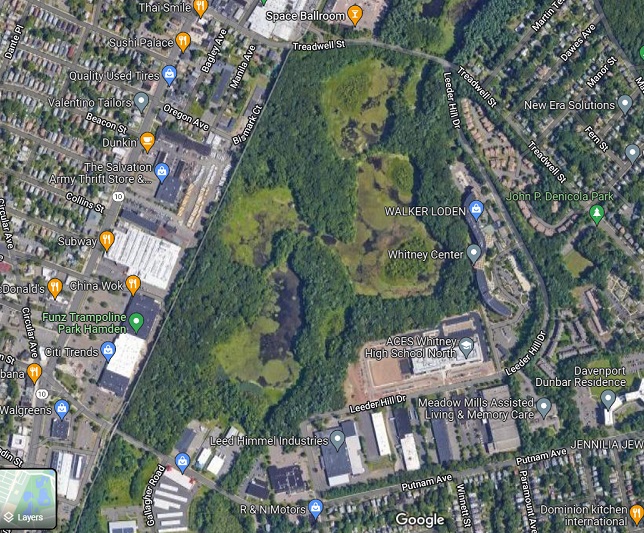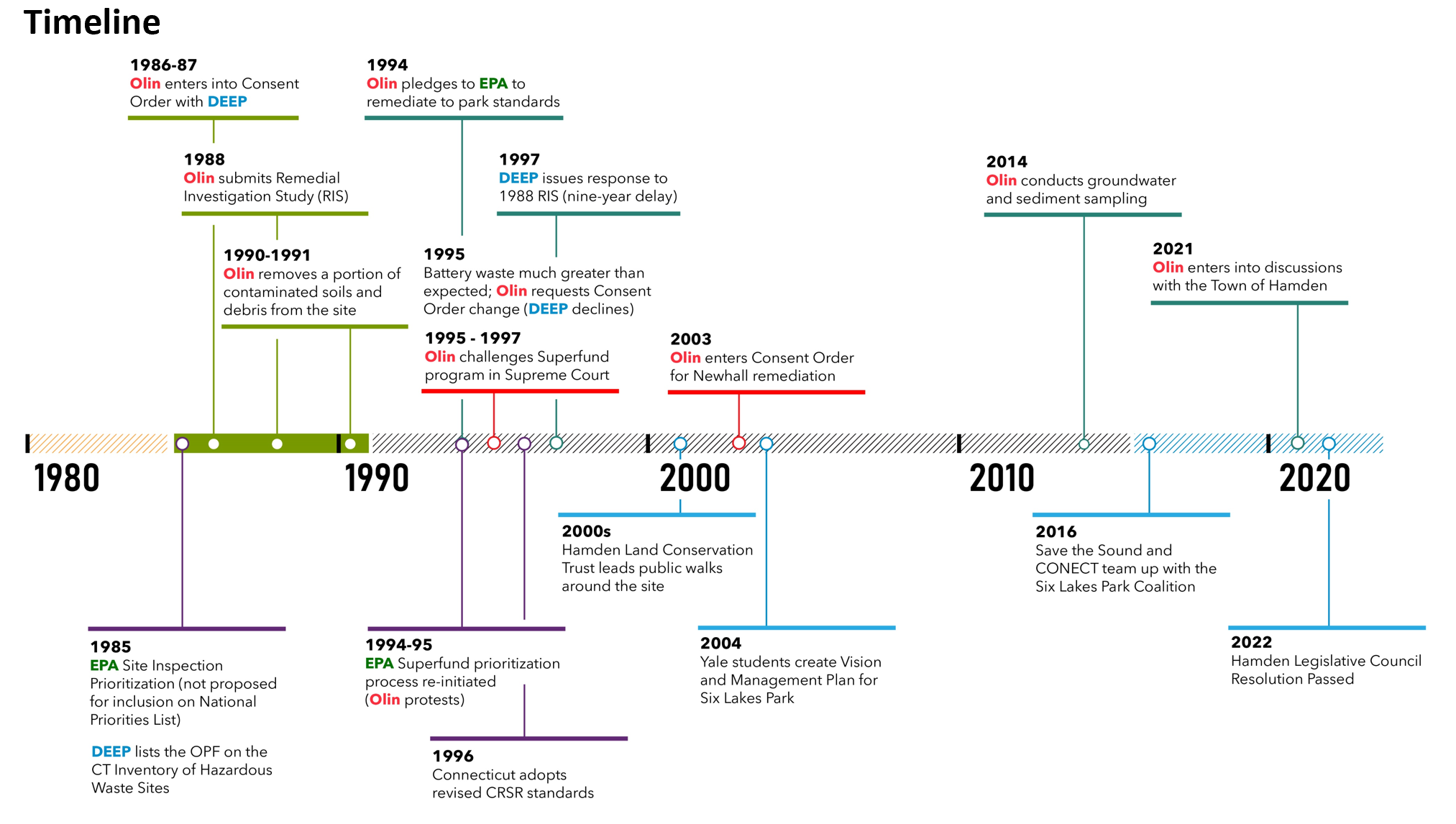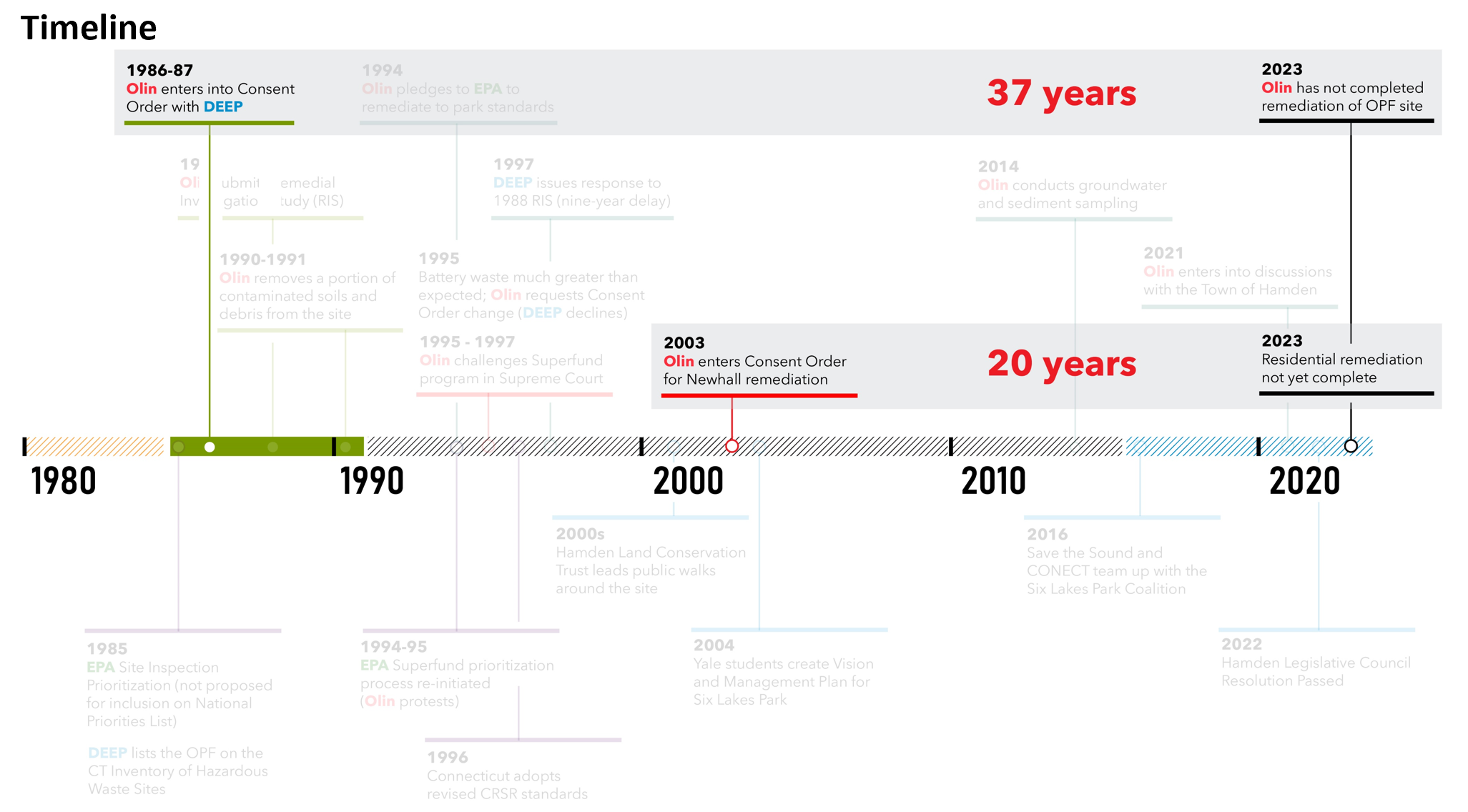The Story of Six Lakes
Six Lakes is a 102.5-acre parcel in Hamden, Connecticut, featuring mature forests, hiking paths, and six beautiful ponds. Home to deer, waterfowl, birds, fish, and turtles, its diverse habitats include a cattail marsh, a red maple swamp, and a 150-year-old oak-pine forest as well as wetlands that connect to the Regional Water Authority’s Lake Whitney water supply.
Six Lakes is bordered on the west side by Dixwell Avenue and the Farmington Canal Heritage Trail. To the east and south are the residential neighborhoods of Whitneyville and Newhall. Locally known first as the Pine Swamp and later as Olin Powder Farm, the Six Lakes property was purchased by Winchester Repeating Arms Company around the turn of the 20th century for gunpowder storage. During World War II, it was used as a firing range for munitions testing. Later, portions of the site served as dumping grounds for battery waste, solvents, and other industrial materials, leaving behind localized contamination.

Credit: Google Earth
In 1931, Winchester was purchased by the Olin Corporation, which still owns the property today. In 1986, the state Department of Environmental Protection issued a consent order to remediate the property. Though the Olin Corporation began the cleanup process, it has been largely stalled since the early 1990s. The Hamden Land Conservation Trust first reached out to Olin about acquiring the property for a park in 1969, and in 1979, the Town of Hamden studied the feasibility of creating a park there. Nevertheless, decades later, the public still has no legal access to the property.
Once the necessary remediation is complete, Six Lakes can safely become a public park–a green oasis connected to an extensive urban trail system, welcoming to all. It’s the last remaining open space in southern Hamden with that potential.


Our Vision
The vision to make Six Lakes a public park welcoming to all has broad support from the community, including local elected officials, religious and neighborhood leaders, state-wide land trusts and environmental organizations, and neighbors in Newhall and Whitneyville, including residents of two large senior housing communities, several apartment complexes, and many single-family homes. The property is also within walking distance of several schools. For now, residents can only catch glimpses of Six Lakes from the Farmington Canal Rail Trail and local streets, but they dream of the day when they will finally be able to walk, run, and play in this remarkable landscape.
Environmental Justice
Six Lakes is connected physically, hydrologically, and historically to the Newhall neighborhood. Many of Newhall’s predominantly Black, working class families came to Newhall during the Great Migration to work in the nearby Winchester Repeating Arms Company factory. The land on which Newhall was built was once a system of wetlands that flowed into Six Lakes. These marshes were filled with industrial and municipal waste by Winchester and the Town of Hamden over the course of decades before being developed with modest single-family homes. The neighborhood underwent a large-scale environmental cleanup in the early 2000s due to the advocacy efforts of Newhall community leaders, but the emotional legacy of contamination lingers today, and numerous homes still suffer from unremediated damage.
What Our Supporters Are Saying About Six Lakes
Six Lakes is a lovely asset for Whitney Center. Its natural beauty, privacy, and bird life make living here so pleasant for all of us.
 Joe Blumberg, Whitney Center resident
Joe Blumberg, Whitney Center residentThe Six Lakes Park Coalition’s efforts toward the remediation of the Olin Powder Farm site and transitioning it to much-needed parkland addresses environmental concerns while opening the benefits of healthy green space in a historically marginalized neighborhood.
 Kristin Barendregt-Ludwig, Yale Center for Environmental Justice
Kristin Barendregt-Ludwig, Yale Center for Environmental JusticeSix Lakes is an oasis of tranquility. You feel in unison with nature, surrounded by nature. You feel a part of it.
 Elizabeth Hayes, Newhall resident
Elizabeth Hayes, Newhall residentResidents in Southern Hamden need more open spaces and recreation spaces. Working to make Six Lakes a state park is a priority of my administration. My goals as mayor are to improve residents' lives and create a more affordable future for Hamden. Six Lakes will improve health outcomes for our residents and improve quality of life. This would also be a boom to economic development that would increase our grandlist… It is rare to find large open spaces in urban settings. Exchanging a site that caused environmental harm and a business practice that has added to the number of guns in our country into a park that improves people’s lives would be an amazing accomplishment.
 Mayor Lauren Garrett, Town of Hamden
Mayor Lauren Garrett, Town of Hamden

